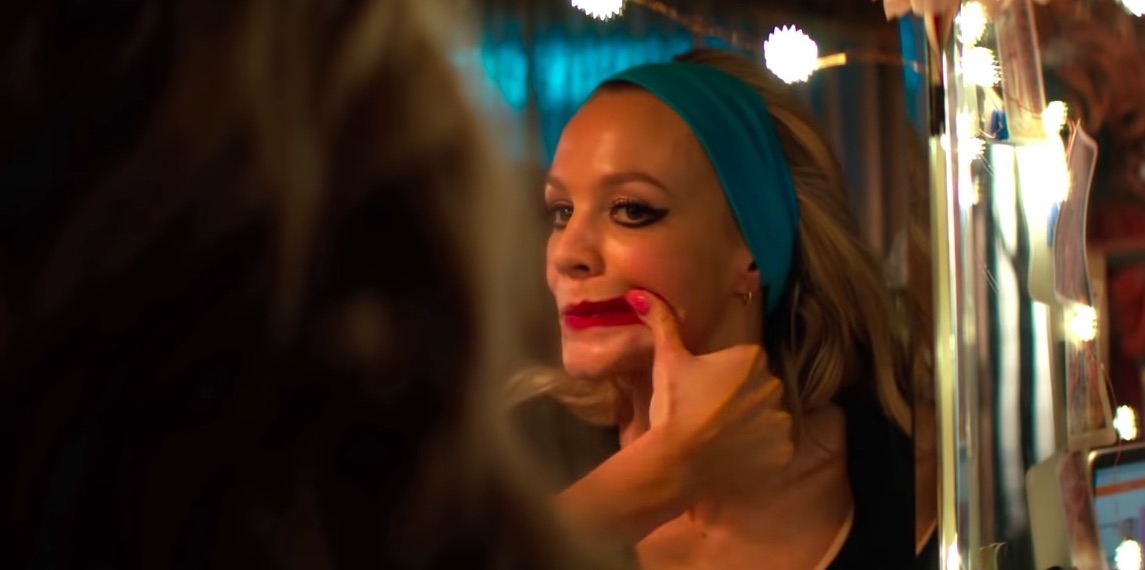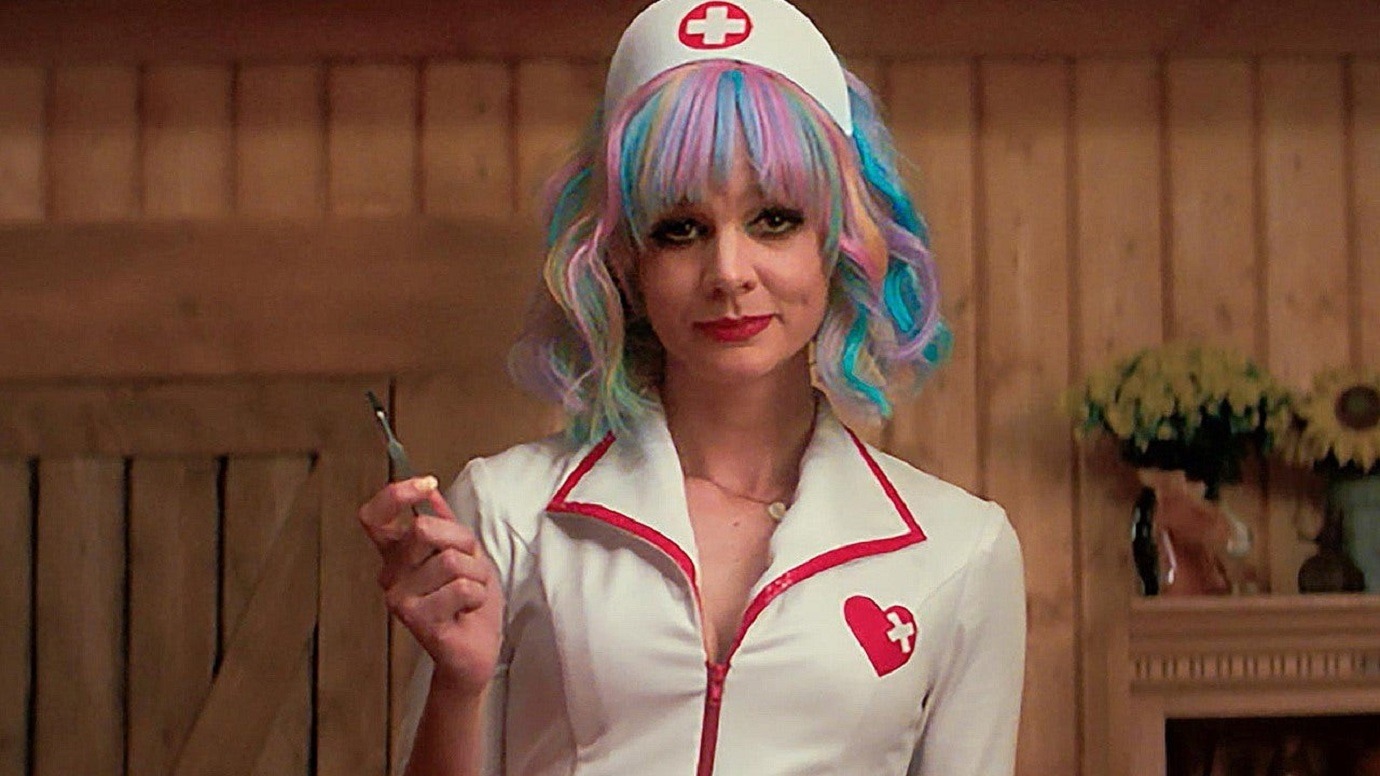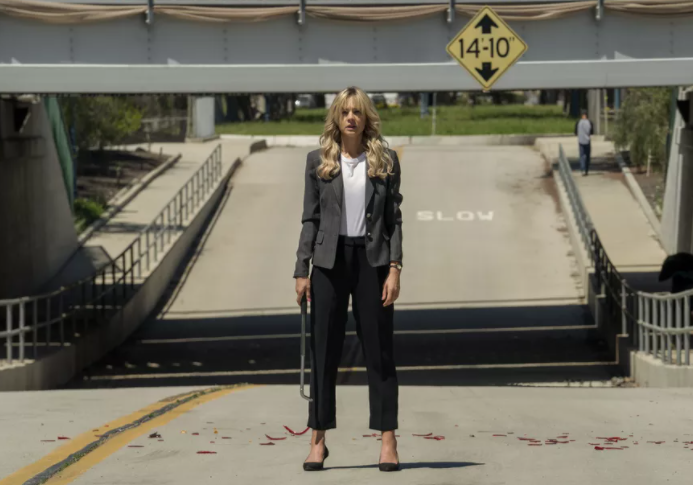How Do You Solve a Problem Like Nina: The Ghost of "Promising Young Woman"
 Thursday, January 21, 2021 at 3:00PM
Thursday, January 21, 2021 at 3:00PM by Lynn Lee

Warning: MAJOR SPOILERS for Promising Young Woman. Do not read until you've seen the film.
Can we all agree that Carey Mulligan IS Promising Young Woman? Not just that she’s sensational in it, though she is. No, I mean she is the movie: her performance as the tormented and tormenting protagonist, Cassie, is what holds it together and propels it to its gut-punch of a conclusion.
That’s not to shortchange PYW’s solid supporting cast or writer-director Emerald Fennell, who brings impressive confidence and panache to her feature debut and whose razor-sharp script gave Mulligan a perfect opportunity to shine. But what could have remained merely provocative on page really needed the right acting touch to sell the character’s complex blend of steeliness and vulnerability, wit and anguish, sexiness and inconspicuousness, icy calculation and seething rage, on screen. Luckily for Fennell, and for us, Mulligan convincingly conveys all aspects of this unlikely avenging angel and fuses them into a cohesive, if conflicted, whole.
Well, almost all aspects...

There is one that remains a head scratcher, though not through any fault of Mulligan’s. It’s Cassie’s weirdly symbiotic relationship with a character who remains, for all intents and purposes, a ghost.
If you went into Promising Young Woman having only seen its trailers, you might have reasonably assumed that Mulligan’s character was the victim of a sexual assault for which the perpetrator was never held accountable. Not so. The victim wasn’t Cassie but rather her best friend Nina, a fellow medical student whom she’d known since childhood. Why Fennell adopted this device isn’t entirely clear. It may be related to her more general goal—which she’s discussed in multiple interviews -- of subverting viewers’ expectations and desires for a simpler, more viscerally satisfying revenge fantasy in favor of the darker reality of the power dynamic between men and women. Or it may just be that certain turns of the plot would have been harder to engineer if Cassie had been the original victim. (As it is, some of those turns require some pretty hefty suspensions of disbelief.)
Whatever the reason for her existence, Nina becomes the most important character we never see in the movie, even though we don’t learn much about her beyond the bare-bones outline of the terrible things that happened to her: she got drunk and was raped at a party, she filed a complaint, the rapist got off scot free, and ultimately the distraught Nina committed suicide.
That’s a lot—enough to enrage any good friend. But it’s also all there is. Indeed, all that remains of Nina’s presence is the torch Cassie is still carrying for her. Even as Cassie wields this torch against the men and women who were complicit in her friend’s fate, she remains tight-lipped about Nina herself. Very late in the movie, in its most upsetting scene, Cassie finally unburdens herself—to Nina’s rapist—about what he took away from her:

Nina was extraordinary. So smart. Weirdly smart. She was so completely herself. Even when she was four years old. She was fully formed from day one. Same face, same walk. And funny. Like a grown up is funny, kind of shrewd. I was just in awe of her. I couldn’t believe she wanted to be my friend. She didn’t give a fuck what anyone thought apart from me, because she was just... Nina. And then she wasn’t. Suddenly she was something else. She was yours. It wasn't her name she heard when she was walking around. It was yours. Your name all around her. All over her, all the time. And it just... squeezed her out.
It’s a torrent of long-repressed cold fury, devastatingly delivered by Mulligan. Yet something about it doesn’t quite resonate as it should, because the audience still doesn’t really know Nina or anything about her except what she represented to Cassie. In a way, that may be the point: Nina got erased by everyone other than Cassie, who’s only been able to hold on to her by restructuring her own life around the horrible injustice that curtailed Nina’s.
One could even see Cassie’s arc as an extended channeling and absorption of her dead friend’s spirit—culminating in her erasing herself and finally becoming fully one with Nina in the film’s grim apotheosis. (There’s probably a bad alternate version of this story kicking around somewhere in which Nina turns out to be a hallucinated projection of Cassie’s trauma, but thankfully not in this version.)
However one slices it, Promising Young Woman’s elision of Nina – and Cassie’s desperate attempts to reverse it – present a particularly bleak take on the long-term effects of rape and a culture that won’t hold rapists accountable. It’s not wrong, even if it’s not the only or even the most appropriate possible response. Still, the film compounds the very problem it identifies by making the central victim a ghost or trope rather than a real character and turning its central character into yet another ghost. It’s troubling enough to have no answer to “Who was Nina?” other than “the victim” or “the motivator.” It’s even more troubling to have no answer to the question “Who was Cassie without Nina?” That most viewers probably won’t be troubled by this at all is a tribute to the power of Mulligan’s performance. But it doesn’t make the question go away.




Reader Comments (18)
I have a feeling that Carey is this years Best Actress winner.
Loved this piece and loved diving more into the character of Nina and her role in the story. I enjoyed how Nina felt like this spectre that was the driving force of Cassie. Loved how you talked about how Cassie's all-consuming focus on avenging Nina ended up also squeezed out Cassie's own individuality. It reminded me of a lot of the scenes with Laverne Cox where she would question Cassie's motives and try and get her to move forward. In some ways, Nina feels like the character of Rebecca in Rebecca. She's this presence we never see but is felt all around and she is the offscreen driver for our lead. Great movie! Great piece!
Mulligan is overdue for an Oscar win.
She was Oscar worthy in:
Never Let Me Go (lead)
Shame (supporting)
Inside Llewyn Davis (supporting)
Wildlife (lead)
Just watched Nomadland, yes, beautiful movie, however, it has the trademark McDormand reactions in most scenes (what a predictable actress in terms of choices! it's insane, she's not even changing the hairstyle, if I'm not mistaken! Is she taking notes from Katharine Hepburn?), she's already won 2 Best Actress Oscars (Ronan in Lady Bird - superior performance, character and movie), let's not go there again, shall we?
Haven't seen Viola in Ma Rainey's Black Bottom, but she's already won the Oscar and I've been listening to how she's black & poor, every year, since 2008 (when Doubt happened), that's 13 years now, to say that it's insufferable would be an understatement.
Give Carey Mulligan the Oscar it's a killer performance
Mulligan's performance was great. I agree the main reason Nina remains unseen is because many of the plot logistics wouldn't work otherwise -- it's plausible to believe the college crew wouldn't remember Nina's quiet friend, much less believable if she was the one who was actually raped and pressed charges. What stretches believability a bit is Cassie's total devotion to her One Best Friend. She seems totally outgoing and conversational at the coffee shop.. tough to imagine she never had other friends, or that she was so devoted to her One Best Friend that she'd upend her entire life over it until the end of time.
But that's nothing to take away from the performance, which rocked.
@Yavor I agree on your assessment of McDormand whom I feel is way overrewarded & overpraised but she is totally the opposite of her usual no bullshit persona but a third is a bit much.
I'd be fine with her winning for Nomadland if Saorsie could've had 2017's Best Actress.
Davis again is totally opposite to her usual noble black woman against the odds persona,not a tear or runny nose in sight,I liked her in MRBB but the movies is a boringly filmed play and Viola although the best thing in it feels like a supporting character.
Kirby is not winning or being nominated for much despite the Volpi cup.
Zendaya seems like the only other possibility cos actos will love M and M.
If Pfeiffer's movie was better reviewed i'd have said her.
If Lesley Manville or Carrie Coon's movies were more widely seen i'd have said maybe on of those 2.
“Haven't seen Viola in Ma Rainey's Black Bottom, but she's already won the Oscar and I've been listening to how she's black & poor, every year, since 2008 (when Doubt happened), that's 13 years now, to say that it's insufferable would be an understatement.”
Well Viola ~is~ Black so there’s no way around that. As for her playing lower class women, watch Widows or her tv show How to Get Away With Murder. Even as Ma Rainey, she isn’t financially struggling. Weird comment.
Lynn -- Love this piece, Lynn. One thing I thought about while reading it is the idea that being perfect as a film is not necessarily a plus. Sometimes films that have messy contradictions are the ones that end up bing th most loved... as if flaws are what makes them their most authentic self. I go back and forth on this movie but I liked it so much more the second time that I was wondering why i was so resistant the ifirst time.I see some flaw (including Nina and my other big reservation is think some of the actors -- not Carey or Bo! -- have a problem with the tricky tone )
Paranoid -- hmmm. i felt the opposite. She was so oft putting that the thing that stretched creduility for me at first was that Bo Burnham's character would be so instantly charmed by her rudeness... so i can sorta see the no friends thing.
Christopher -- ooh, love the Rebecca shout out. I can see it.
Lynne, this is a beautiful piece. So smart and incisive and well done. Thank you for it.
Yavor, I think i understand your comment. In interviews, Viola is pretty insufferable. She's completely humorless and despite great success often paints herself as a victim, and is relentless about it. It turns a lot of people off...TBH, I barely know anybody who enjoys her. An unpopular opinion to say here, but I've been astonished at the amount of people who comment negatively.
Nathaniel, I agree with you 100%. It is a flawed, messy movie, but the ideas are big, and the ambition is big, and the messiness kind of makes it. Fennell doesn't yet have the experience or technique to pull off those quicksilver shifts in tones all the time, but she's aiming high and lands all the important moments. Plus she gets Carey to give the superb performance Lynne writes about so intelligently here, and I agree with markgordonuk that she will be our Best Actress winner.
EricB - Everything you said about PYW. I'll be eagerly waiting for what Fennel does next. Ambition and bravery are more interesting to me than skill in debut directors, so her future looks promising.
Coincidentally, I managed to catch it last night....Mulligan was divine. She's my pick for Best Actress. I know McDormand is way ahead in terms of critical acclaim but she left me cold watching Nomadland - the same old reaction shots and expressions. Viola did nothing drastically different in her movie as far as I'm concerned. Mulligan on the other hand got me hanging onto her every word and glance as if I were watching her perform on set.
@Yavor - you are right. Viola is insufferable in her interviews - not only has she been talking about her humble beginnings for the longest time (sometimes the interviewers didn't even ask for it, she's largely humorless.
Why does it matter? The movie operates from a place of righteous angry and vengeance. When we hear news stories about murder or rape the victim's existence and visibility is wholly bound up in what has happened to them. Not whether or not that had value or was interesting prior to the grim violation.
I'm glad the writer-director told a story of sisterhood solidarity to unite female viewers.
Christopher - I love the Rebecca comparison, brilliant! Although in Rebecca what was interesting was that you *did* get a, maybe not clear, but certainly vivid sense of her as a person early on that builds throughout the movie, the twist being it turns out to be completely false. Here - we just never even get that.
Nathaniel and EricB - thanks. PYW is definitely flawed - while I really liked it, I kept picking at the things about it that didn't quite add up or come together, and yet they didn't affect my overall reaction to the movie. I guess sometimes loving a movie is like loving a person, you feel compelled to defend or at least understand the flaws, whereas something/someone with no apparent flaws can sometimes leave you a little cold.
3rtful - but that's exactly what's so sad and awful about it, this idea that "the victim's existence and visibility is wholly bound up in what has happened to them." It matters because it's basically denying the victim any identity other than just that and suggesting it's something (s)he can never escape. Like I said, it's not wrong, it just cuts against the female solidarity I agree the movie also celebrates, and the appearance of empowerment Mulligan sells so effectively.
Incredible piece on an extraordinary movie! I so loved reading it!
"Nina got erased by everyone other than Cassie, who’s only been able to hold on to her by restructuring her own life around the horrible injustice that curtailed Nina’s."
I totally agree with this - Cassie (Cassandra) is truly like the Greek princess who was cursed to bring forth prophecies that no one would believe. She takes on Nina's pain as her own. In a way, that makes Nina's ambiguity more potent for me - Cassie is the one keeping the spirit alive for the deceased (and in a sense, all women who have suffered the traumas of rape and sexual assault). I think it's even telling in Molly Shannon's brief but glorious cameo that even she wants to put the past behind (including the events that transpired with her daughter) in her polite, but very cool confrontation with Cassie. No one wants to acknowledge the truth, existence, and definitely not the fate of someone like Nina, so it's foisted on Cassie to take up this cause for how she see fits.
And since we always discuss Oscar on this site, I have to just put it out there that Carey Mulligan should be walking away with the best actress award in a landslide. It's such a STAR performance, but I really am worried on how the Academy as a whole will embrace the film. Not only is it such a "prickly" character (and undoubtedly some older male Academy members will just revile this film and her character in general), but the film is unabashedly female - from its subject matter, soundtrack, production design, costumes (all which should be in contention, including Emerald Fennell's stunning direction and screenplay). In a way, I think Pieces of a Woman is much more Academy friendly. After the first 30 minutes, it basically turns into a relationship drama, which the Academy often goes for. And Kirby's character is highly "sympathetic". We shall see, but Promising Young Woman is definitely my favorite film of the year.
After watching the movie I thought Carey Mulligan would be a great Harley Quinn. (I like Margot Robbie in the role).
I see it this way.
The race is between Carey, Frances, Viola, and Vanessa.
Vanessa is a newbie in terms of film awards, so the nom is the award.
Viola’s role was baity, but it is borderline supporting.
Frances’ performance is amazingly subtle, but she already has one too many.
Carey is explosive in a true leading role and can be considered overdue.
She can actually win this thing, which is weird considering that last year I did not even think this film will attract Oscars.
i was completely blown away by the movie [which i just finished watching half an hour ago]. i hope emerald fennell is showered with as many awards as carey should be
[but i don't understand how they were pushing the film for comedy globes - i was so freakin' tense the entire way through - except for bo burnham's adorkable bits]
The critique here, fails to consider how impactful vicarious trauma and moral injury is. That's what I loved about the writing of this movie - it's not just the survivor of violence that is affected, but those that love and care for the survivor. And in this case, become survivors themselves, given that Ninasuicides. The rest, the critique of male and white privilege was so well done. Loved it.
Carey deserves the Oscar. And I know it's a long shot but Burnham needs to be nominated for Best Supporting Actor..